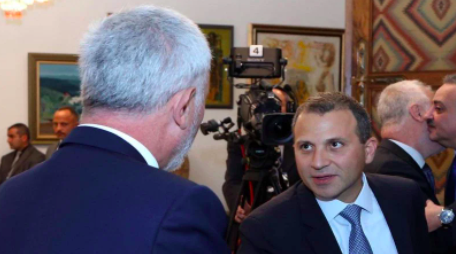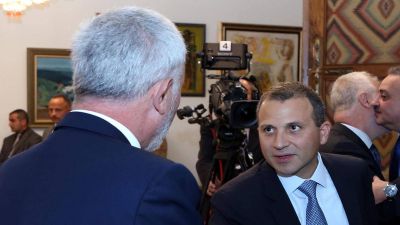
FPM leader Gebran Bassil greeting Marada Movement leader Sleiman Frangieh during a dialogue session. (Credit: Dalati and Nohra)
For Hezbollah, the coming weeks are crucial. The party sees the elections as a challenge, so much so that its Secretary General Hassan Nasrallah himself stressed that this time around the party must support its allies in a bid to maintain its majority in Parliament.
The polls and the negotiations that may follow regarding the presidential elections or other institutional changes are all taking place against the backdrop of regional developments.
Given that it’s a decisive time and a volatile situation, Hezbollah is working on closing ranks with its allies. It is with this logic that Nasrallah extended an invitation for an iftar to both Free Patriotic Movement head Gebran Bassil and the leader of the Marada Movement, Sleiman Frangieh, on April 8.
It has become significantly important for Hezbollah to put an end to the battles within the March 8 alliance, especially between the Christian leaders within the camp.
According to several corroborating sources, the discussions during the gathering focused on regional issues, while both Bassil and Frangieh each tried to guide the conversation back to more local considerations.
The meeting began with a broad and comprehensive presentation of developments in the region, from the nuclear negotiations between the United States and Iran to the Russian-Ukrainian war and its repercussions.
Regarding the Vienna talks, Nasrallah informed his two allies that an agreement was almost finalized technically, and that the decision was now political.
According to the same sources, Hezbollah’s leader also said that any nuclear agreement would have a positive effect on Iran and its allies in the region, and therefore many developments are to be expected should it come to pass.
This, he said, requires closing ranks and focusing on strategic issues rather than being distracted by internal conflicts.
“If internal issues were a priority, the meeting would have been held before the closing of the electoral lists,” said a senior Hezbollah official who wished to remain anonymous.
Frangieh is the party’s candidate
While Saudi Arabia has re-engaged with Lebanon, and many of the March 14 forces are regrouping, Hezbollah wants to consolidate a united front to face them.
“The objective of the meeting is to prepare for the post-election phase. The party wants to obtain a parliamentary majority in view of government formation and the presidential election,” said a senior politician from March 8.
Several sources close to the party said that the presidential election was not touched on during the meeting.
“For months, Hezbollah has been working on bringing its two allies closer together. It is the extent of the differences between the two sides that delayed the meeting,” the senior party official added.
L'Orient-Le Jour learned that Nasrallah held two separate meetings a few weeks ago with Bassil and Frangieh, during which both men discussed the possibility of reconciliation.
While the presidential issue was not discussed as such during the iftar, the subject was on everyone's mind.
“Hezbollah wanted to send clear signals to its allies. While Bassil will have its full support in the legislative elections, Frangieh will be its presidential candidate,” said a politician familiar with the talks.
But why endorse Marada and not the FPM leader?
Mainly because Frangieh maintains good relations with all political forces in Lebanon, except the Lebanese Forces, as well as with foreign countries, such as the Gulf States, the US and France.
Bassil, for his part, is isolated on the local scene and has been under US sanctions since November 2020.
According to information obtained by L’Orient-Le Jour, Frangieh was recently on a visit to Paris, where he met with French officials, in the context of the May 15 elections.
‘Bassil wanted an alliance in the North’
“We just want to settle our differences with Bassil. Electoral alliance is out of the question,” a Marada source said, commenting on the significance of the meeting.
On the FPM side, sources believe that “Bassil is the biggest beneficiary of this meeting, because he had nothing to lose.”
The president’s son-in-law told his partisans that the meeting served as a way to break the isolation he has been a victim of.
A source close to Bassil said that the FPM leader insisted that the gathering take place after the finalization of the electoral lists so that it would not be interpreted as a desire to forge an alliance in the North Lebanon III constituency, where the main candidates for the presidential election are running.
Marada, however, refutes this version.
“Bassil actually wanted an alliance in the North. It was Frangieh who said no,” according to a Marada source.
L’Orient-Le Jour learned that Frangieh proposed a comprehensive agreement that included the elections, the government formation and the presidential election, a proposal that Bassil rejected.
But Hezbollah is not following the same logic, deeming these considerations secondary to what is at stake.
In the party’s eyes, the rapprochement between Bassil and Frangieh is as important as the reconciliation between the Amal Movement and the FPM.
Hezbollah has indeed convinced its two allies to present candidates on the same list in several constituencies such as Beirut II, Baabda, West Bekaa, North Bekaa and Zahle.
The Iranian-linked party wants to send a clear message that the Christian majority is still loyal to it.
These signs are addressed both internally and externally, especially in light of the potential upcoming visit of Pope Francis to Lebanon and amid media leaks about calls for dialogue between Bkirki, the seat of the Maronite Church, and Hezbollah.
The party is therefore trying to strengthen its position and its relations with its Christian allies so that they can later impose a fait accompli regarding its relationship with the Christian community.
This article was originally published in French in L'Orient-Le Jour. Translation by Sahar Ghoussoub
